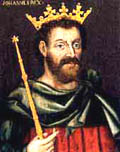John I, "Lackland", King of England
John, future king of England and youngest son of Henry II
and Eleanor of Aquitaine, was born 24 December 1167 in Beaumont Palace, Oxford,
England. John would eventually become his father's favorite son, but at
his birth Henry II did not designate any lands to him as he had to his other
sons. It was because he did not have any land to inherit that Henry II
called him "Lackland." Ultimately, when Henry II had gotten Ireland
under his control, he would designate it to John, and he would also attempt,
with resistance, to carve a portion of land for him from that which he had
reserved for his older sons.
Eleanor of Aquitaine biographer, Amy Kelly, describes John as
darker in coloring than his brothers Henry and Richard, and also as deceptive,
of questionable character, and untrustworthy. John was much younger than
Henry's other sons, but he did manage to get involved in the final scheme
against his father in 1189. When Henry found out that his most beloved son
had betrayed him, he is alleged to have given up the will to live, saying "I care no more for
myself nor for aught in this world" (Kelly, 245).
John also engaged in deceit when his brother, King Richard I,
went on crusade. At his accession, Richard had granted John the title
Count of Mortain and granted him a number of castles and tracts of land in
England. Even still, while the king was gone, John attempted to take over
the kingship and convinced Richard's barons and bishops that their lord would not be
coming back. In the end, his mother Eleanor assisted Richard in regaining
the throne, but it was clear that John could not be trusted.

When Richard died in 1199, John acceded to the throne of
England. John quickly got involved in war with King Phillip of
France when he married Isabel of Angouleme and attempted to lay claim to land in
France under her name. As a result of the confrontation, John lost a
sizeable amount of his land in France, including Normandy, Brittany, and Anjou
and only managed to retain a part of Aquitaine. John also got into
disagreements with his barons, who in 1215 forced him to sign the Magna Carta,
which has come to be viewed as a fundamental document in English law. John
later refused to recognize the Magna Carta and was engaged in fighting with his
Barons over it at the time of his death on October 18, 1216 from dysentery. At his
death, his eldest son Henry assumed the English throne and a peace settlement was
reached between the barons and the monarchy.
Back to Individual
Biographies
Back to Top

![]()